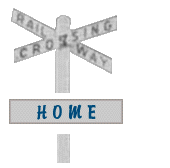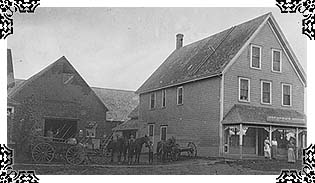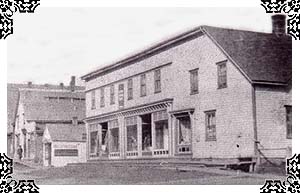









The Barretts of Barretts' Cross | Thomas Sims
 The
Brunswick House pictured here was one of the many inns
and taverns that contributed to Kensington's tradition of
hospitality. Owned by Mrs. Jimmy Lynds, its business
benefitted greatly from its ideal location across from
the railway
station. The travellers who stepped
off onto the platform could simply cross the street and
check in, or else rent a horse and carriage at the
Brunswick's livery
stable if they had to travel another
piece before reaching their destination. However,
Kensington had a long history of inn-keeping even before
the arrival of the railway in the 1870's. The town was
founded at the juncture of the five main roads in the
district, and although these routes were no more than
rough cart-paths, they saw a steady passage of travellers
heading down the Old Post Road from St. Eleanor's to
Charlottetown. This traffic was one of the main reasons
the first settlers chose to remain at the inland
location, and the innkeepers who served the travellers
played a leading role in the founding of the community.
The
Brunswick House pictured here was one of the many inns
and taverns that contributed to Kensington's tradition of
hospitality. Owned by Mrs. Jimmy Lynds, its business
benefitted greatly from its ideal location across from
the railway
station. The travellers who stepped
off onto the platform could simply cross the street and
check in, or else rent a horse and carriage at the
Brunswick's livery
stable if they had to travel another
piece before reaching their destination. However,
Kensington had a long history of inn-keeping even before
the arrival of the railway in the 1870's. The town was
founded at the juncture of the five main roads in the
district, and although these routes were no more than
rough cart-paths, they saw a steady passage of travellers
heading down the Old Post Road from St. Eleanor's to
Charlottetown. This traffic was one of the main reasons
the first settlers chose to remain at the inland
location, and the innkeepers who served the travellers
played a leading role in the founding of the community.
As early as the 1820's, there was an established public house at Five Lanes End, run by Thomas Barrett and his wife, Margaret. The exact date of their landing in Canada, along with Thomas' brother Micheal, is not known. They had many hardships on their sea voyage, and found essentially an unsettled wilderness, with no roads or towns in sight. They travelled through six miles of dense forest--over roots, rocks, and swamps--until they arrived at the spot in the woods where five bridle paths converged, a mere dot on the surveyor's map known as Five Lanes End. Whether they were impressed with the location, or simply relieved to be out of the woods, the Barretts decided to stay, becoming at the same time one of the founding families of the future town of Kensington.
Thomas and Michael secured a shared lease for 95 acres of land from Andrew Thornton Todd on June 10, 1835. Michael married Johanna May of Lot 22, and they had two sons. John Barrett was born in 1835 and Thomas Barrett was born in 1836. Michael died in 1836, and these two little boys were the only descendants of the Barrett name. Thomas and Margaret Barrett had no children.
Life must not have been too bad at Five Lanes End, since Thomas' brother, James, and his mother, Ellen Barrett, and his sister, Esther Barrett joined the family in 1834 or 1835. In June 1842, another sister, a widow, Mary Barrett Gorman, got a lease for land on the Malpeque Road. Esther married Thomas Dunphy, despite (so it is said) her mother's objections, and they farmed on the Margate Road beside James Barrett's farm. There are Dunphy descendants living in the Kensington area today.
At that time, many public houses dotted the stage coach route to accommodate travellers. Laws stipulated what these establishments should provide for their patrons, including stables for the horses, featherbeds, and sufficient foodstuffs and beverages. The Barretts must have met or exceeded all of these benchmarks, because they became respected and widely-known publicans and the site was called Barrett's Cross in honour of their pioneering efforts on behalf of the town.
Thomas Barrett passed away in July, 1842, and was buried at the Indian River Pioneer Cemetery. Margaret, however, continued on as proprietress of the inn for over twenty years after her husband's death. The establishment must have thrived under her direction, as the 1861 census lists substantial holdings, including fifty acres of arable land, four cows and twelve sheep. In 1862, she sold the inn to Jessie Carruthers and moved to Charlottetown where she died on December 1, 1884.
Thomas Sims is best remembered as the man who-- in 1862-- suggested that the name of the town be changed to Kensington, in honor of the palace where Queen Victoria was born. Although the town had probably outgrown its beginnings as a simple inn at a crossroads, and the new name suggested its hopes of Victorian prosperity, it would have been interesting to hear the reaction of the Barretts to this plan! The fact that Sims' proposal of a new name was supported unanimously (and incidentally, was the only suggestion made) suggests that he must have been a man whose opinion carried considerable sway at the time. Like Barrett before him, Thomas Sims was another innkeeper who greatly influenced the history-- and the name-- of his community.
Born in 1824, Sims moved from Charlottetown to
New London in 1838, where his father John Cambridge Sims
was the customs officer at the wharf. When he acquired
the means to set out on his own, he moved ten miles down
the road to Barrett's Cross, where he opened a spacious
inn to provide lodging for  the
travelling public. But Sims' establishment was not only a
place where people came to put their feet up. There must
have been a considerable number of jars raised as well,
as he ran his own brewery attached to the inn.
the
travelling public. But Sims' establishment was not only a
place where people came to put their feet up. There must
have been a considerable number of jars raised as well,
as he ran his own brewery attached to the inn.
The case of Thomas Sims was a good example of the sometimes contradictory attitudes which surrounded alcohol and respectability at the time. Unquestionably, Sims was one of the most upstanding members of the community, and even donated the land for the building of one of the town's first churches, St. Mark's Anglican. Most religions at the time actively supported the temperance movement, which harshly criticized the evils of demon liquor. But despite donating land for a church, Sims was busy hatching plans to build a distillery on another of his lots!
And then the plot thickened even more. After it was announced that the railway would pass through Kensington, an influential Margate merchant, Reuben Tuplin, approached Sims about buying up a large parcel of land. The deal was a lucrative one for Sims, as he was a large landowner but was not very materially wealthy. However, Tuplin found out about the planned distillery, and objected so strongly on religious grounds that the transaction nearly fell through. What made the disapproval so extraordinary was the fact that-- as it was widely known-- Tuplin himself took a tall glass of brandy every single day for 'medicinal purposes'! Perhaps his religious protests were more in the interests of social propriety, because the land purchase went through soon thereafter.
Untainted by his dabbling in distilleries, Thomas Sims remained a respected citizen in Kensington until his death in 1885 at the age of sixty-one. In 1908, James Kennedy purchased the inn and a general store operated there until the building was destroyed by fire in 1928.